23-25 Jun 22, Workshop: Infrastructures of Musical Globalization, c. 1850–2000
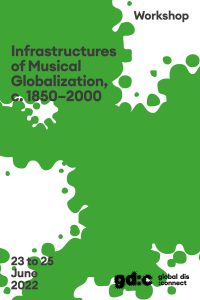 Infrastructures rarely come to mind while making or listening to music. This holds equally true for discovering or playing with unfamiliar sounds from different world regions. As an ephemeral and affective experience, music of whatever origin is difficult to capture, locate, and pin down. And yet, without the emergence, development, transformation, and deterioration of infrastructures, such experiences would have taken quite a different path.
The workshop delved into the material conditions as well as the explicit and implicit prerequisites of making music at a transnational and global level since the 19th century. It is these conditions and prerequisites we approach as musical infrastructures. Often, musical infrastructures as places and institutions – whether public, private, or anything in between – have been taken for granted by historical and present actors involved in musical life. They only receive greater attention if they do not meet artistic, economic, political, or public expectations. Hence, the presence, lack, or transformations of infrastructures are inextricably intertwined with the production of musical culture. This perspective pilots us to issues of law and (global) governance, industry and organization structures, technology and media, transportation, occupational careers, and musical markets.
For this workshop, we assumed that that the emergence, flourishing, dissemination, and decline of musical cultures depend on the musical infrastructures that condition them. Understanding musical infrastructures as driving forces, counter forces, and lateral forces of musical practices, it is their forms and means, their reach, and ultimately their dis:connectivities we have explored more systematically.
You can find the full programme HERE. For more information, please contact the conveners.
Martin Rempe
Infrastructures rarely come to mind while making or listening to music. This holds equally true for discovering or playing with unfamiliar sounds from different world regions. As an ephemeral and affective experience, music of whatever origin is difficult to capture, locate, and pin down. And yet, without the emergence, development, transformation, and deterioration of infrastructures, such experiences would have taken quite a different path.
The workshop delved into the material conditions as well as the explicit and implicit prerequisites of making music at a transnational and global level since the 19th century. It is these conditions and prerequisites we approach as musical infrastructures. Often, musical infrastructures as places and institutions – whether public, private, or anything in between – have been taken for granted by historical and present actors involved in musical life. They only receive greater attention if they do not meet artistic, economic, political, or public expectations. Hence, the presence, lack, or transformations of infrastructures are inextricably intertwined with the production of musical culture. This perspective pilots us to issues of law and (global) governance, industry and organization structures, technology and media, transportation, occupational careers, and musical markets.
For this workshop, we assumed that that the emergence, flourishing, dissemination, and decline of musical cultures depend on the musical infrastructures that condition them. Understanding musical infrastructures as driving forces, counter forces, and lateral forces of musical practices, it is their forms and means, their reach, and ultimately their dis:connectivities we have explored more systematically.
You can find the full programme HERE. For more information, please contact the conveners.
Martin Rempe Fellow KHK „global disconnect“
LMU München
m.rempe@lmu.de Continue Reading






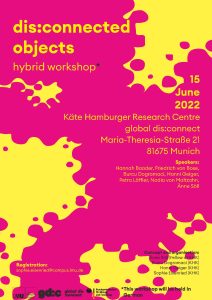
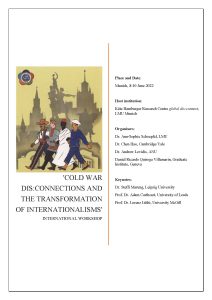 This workshop explores
This workshop explores 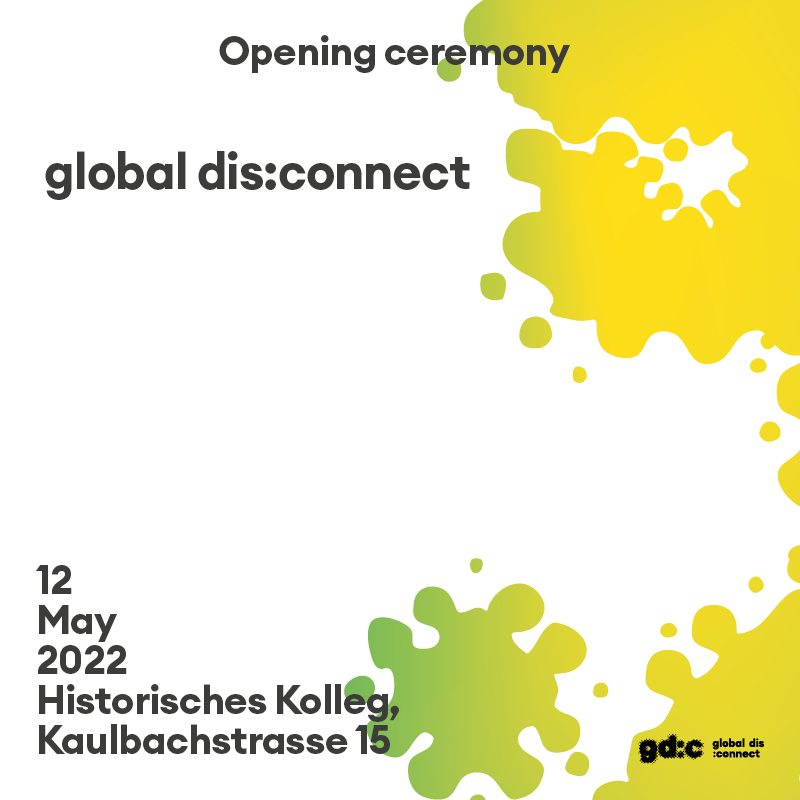 On 12 May 2022 the Käte Hamburger Kolleg global dis:connect was officially inaugurated. The event took place at the Historisches Kolleg in Kaulbachstrasse. The occasion was marked by a keynote lecture from Heidelberg art historian Monica Juneja who spoke on “Awkward, unstable, creative: Dis:connection as world-making”. The lecture was followed by an evening reception.
You find the complete programme
On 12 May 2022 the Käte Hamburger Kolleg global dis:connect was officially inaugurated. The event took place at the Historisches Kolleg in Kaulbachstrasse. The occasion was marked by a keynote lecture from Heidelberg art historian Monica Juneja who spoke on “Awkward, unstable, creative: Dis:connection as world-making”. The lecture was followed by an evening reception.
You find the complete programme 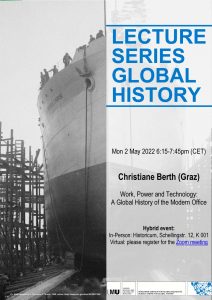
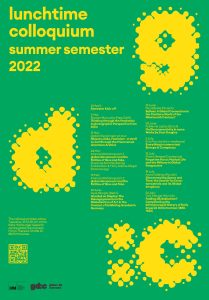 The Kolleg's lunchtime colloquium continues in the summer term. The first session - our traditional semester kick-off - takes place on 26 April.
Please note that due to illness we had to make a few changes to the programme:
On 19 Jul, Enis Maci will speak on "
The Kolleg's lunchtime colloquium continues in the summer term. The first session - our traditional semester kick-off - takes place on 26 April.
Please note that due to illness we had to make a few changes to the programme:
On 19 Jul, Enis Maci will speak on "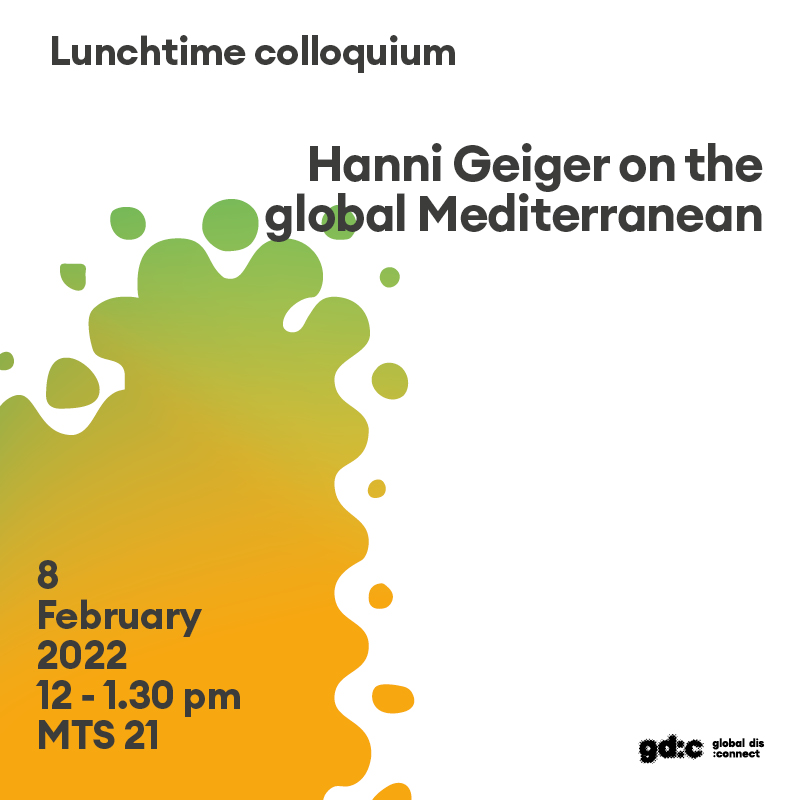 On 8 February, global dis:connect team member and art historian Hanni Geiger spoke on “(Re-)Branding the global Mediterranean through design and image since the 1930s: process and findings” in our winter term lunchtime colloquium series.
You will find the lunchtime colloquium programme for the winter term 21/22
On 8 February, global dis:connect team member and art historian Hanni Geiger spoke on “(Re-)Branding the global Mediterranean through design and image since the 1930s: process and findings” in our winter term lunchtime colloquium series.
You will find the lunchtime colloquium programme for the winter term 21/22 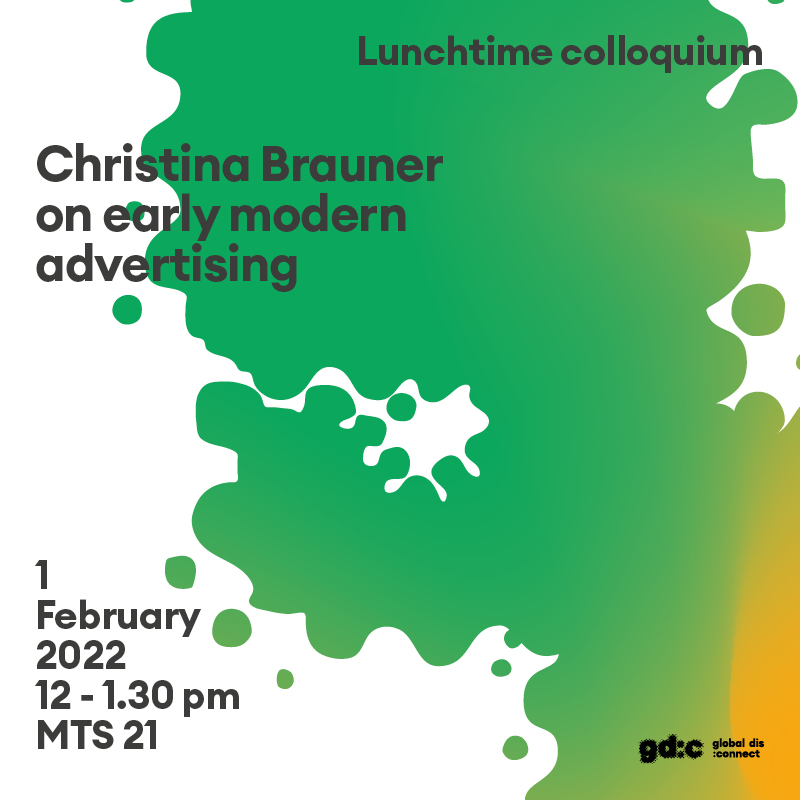 On 1 February, our fellow Christina Brauner (Tübingen) contributed to the winter term lunchtime colloquium series with a talk on “Competition as dis:connection? Some thoughts on early modern advertising”.
You will find the lunchtime colloquium programme for the winter term 21/22
On 1 February, our fellow Christina Brauner (Tübingen) contributed to the winter term lunchtime colloquium series with a talk on “Competition as dis:connection? Some thoughts on early modern advertising”.
You will find the lunchtime colloquium programme for the winter term 21/22 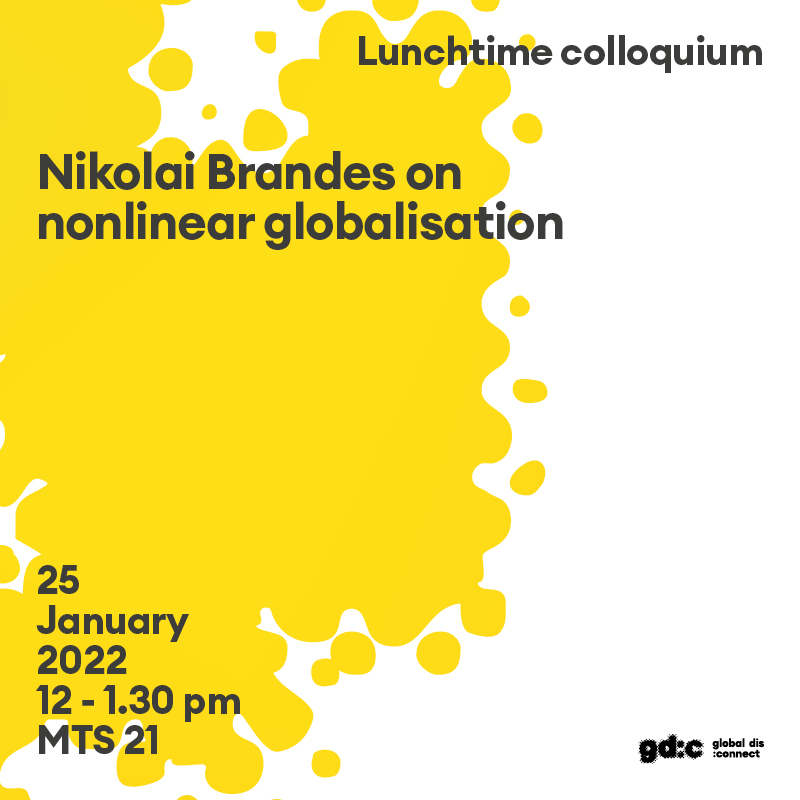 On 25 January, global dis:connect team member and architectural historian Nikolai Brandes spoke on “Southern pedagogies and nonlinear globalisation: towards a study of schools of architecture in sub-Saharan Africa, 1954–1992” in our winter term lunchtime colloquium series.
You will find the lunchtime colloquium programme for the winter term 21/22
On 25 January, global dis:connect team member and architectural historian Nikolai Brandes spoke on “Southern pedagogies and nonlinear globalisation: towards a study of schools of architecture in sub-Saharan Africa, 1954–1992” in our winter term lunchtime colloquium series.
You will find the lunchtime colloquium programme for the winter term 21/22 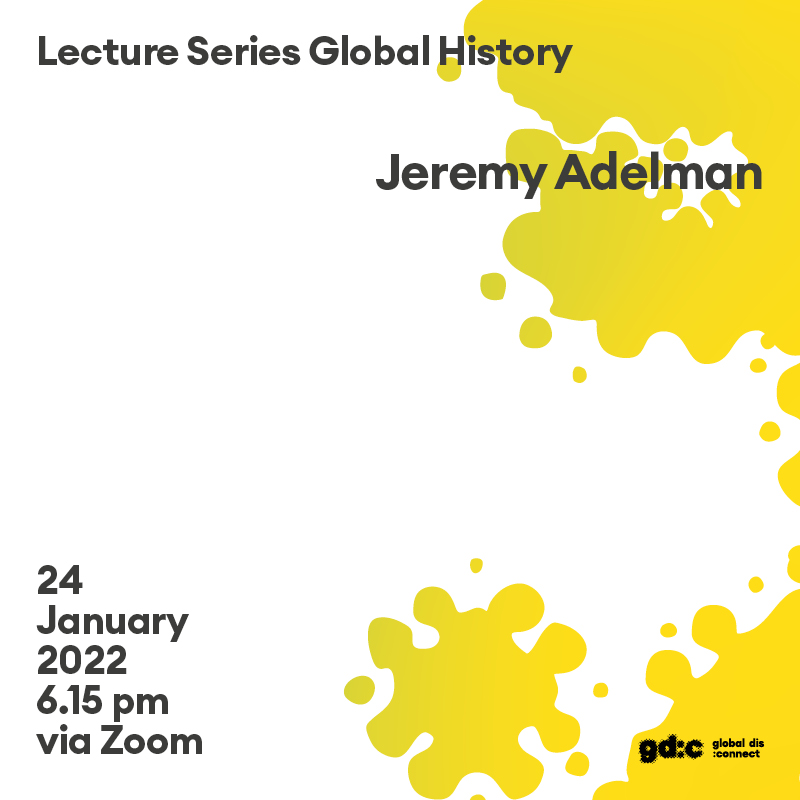 On 24 January 2022, Jeremy Adelman from Princeton University has spoken on “The World in Pieces Again: A History of the Present” in our Lecture Series Global History. This was an all-online Zoom event with more than ninety registered participants.
On 24 January 2022, Jeremy Adelman from Princeton University has spoken on “The World in Pieces Again: A History of the Present” in our Lecture Series Global History. This was an all-online Zoom event with more than ninety registered participants.